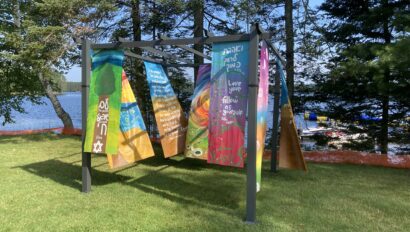In the waning hours of Sunday, August 14, as the sun began to fall in the sky and the fast day of Tisha B’av wore on, I made my way through the cabins one last time. A few hours after camp emptied out from the nearly three hundred participants and staff in Family Camp and exactly one week since six hundred-plus campers and staff began bidding their own final farewell, time was ticking away on my own 2016 summer and, in turn, on the cabins and space we have known for decades as גבעת נבונים (givat Nivonim), Nivo Hill.
I spent five summers on the givah, as a camper, counselor, and Rosh Aidah (Division Head); each of them contains many, many cherished memories I will never forget. Nivonim at Ramah Wisconsin, in certain circles, is not just a summer, not just the culminating experience of one’s camper years, but a Platonic ideal of communal and educational possibility, a testament to all we are about. It is a statement, encapsulated in my favorite phrase of the aidah cheer: lilmod ul’lameid b’otah pe’ulah – to learn and teach in the same activity. Nivonim have already begun the transition from camper to staff; they are open to learning, as we all should be, and uniquely poised to begin giving back, teaching, leading, and offering themselves to their aidah and the broader community at camp and beyond. When the program works – and it so often does – it can be breathtaking to uphold. The camper who steps up on Yom Sport (Camp-wide Olympics), who finds unanticipated meaning in a service project, internship, or the counselor-in-training program, who shines in the English Play. The group, as a whole, who wows the entire camp during their musical, who express the pure joy of so many moments during the summer.
This past summer, Nivonim 2016 focused on the concept of “legacy” as well as their own legacy, as they grappled with the pros and cons of being the last of 47 Nivonim aidot to live on the original givah. In addition to making physical contributions for the new campus, they spent time learning and thinking about how legacy works and how they wanted to be remembered. On a basic level, this is the work of every Nivonim aidah, an essential part of reflecting on what the central unit of camper community has meant to us as we prepare to transition to a new phase of our lives. On an individual basis, this is the work Judaism asks us to do during the month of Elul in the lead-up to the High Holy Days and Rosh Hashanah, the beginning of the year.
Reflecting on the past in order to move forward is one of the many ways camp hammers home lessons from our Jewish tradition that are relevant to the rest of our lives. In age-appropriate ways, Nivonim 2016 struggled with the classic dilemma with which I am certain Nivonim 2017 will also be faced: how do major physical changes impact our experiences? Though the terrain of the givah will be different moving forward and the campus will be new, the experiences will be similar: each aidah puts its own unique mark and writes its members’ own unique stories at camp while the legacies of every aidah resonate with all others. As we approach the cheshbon hanefesh, the “personal accounting” of this season on the Jewish calendar, each of us in our own way must face the constant change around us and the paradox of human existence: the continuity of our own identity (and identities) within experiences that feel disjointed.
As I walked through the original givah one last time on Sunday afternoon almost a month ago, I was trying to hold onto this physical space I knew would be no more in a few short hours. My entire approach, however, was ironic. Not only had I known for nearly twenty years, since I was a camper in the musty boys cabins in 1997, that these buildings could not last forever, but the ephemeral memories of my time in and around those cabins in ’97, ’02, ’04, ’05, and ’06 had nourished and sustained who I am ever since. The memories, originally, were forged on that ground; but the role the memories have played is connected to the lessons I have learned from those experiences, the love I feel for those people, and the emotions each episode evokes.
This time of year, for us in the Ramah office, is a time to reflect and account for the summer just ended even as we begin planning and dreaming for next year. Thus we are blessed to follow the dominant rhythm of the Jewish year during Elul. May we all be blessed with the ability to thoroughly take an inventory and accounting of who we were and who we would like to be, as we turn the corner in a few short weeks into 5777. For back up at camp, tons of earth has been moved and the foundations are being laid for our new Nivonim campus, a differently-shaped givah but one equally positioned to provide the memories and impact of the originals – for the next forty-seven years.
Shabbat Shalom.






